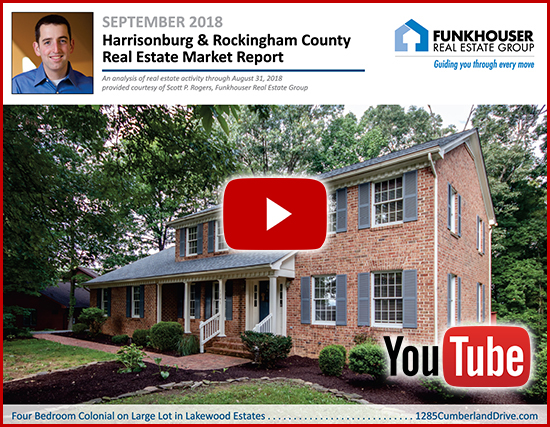Buying
| Newer Posts | Older Posts |
Any Part Of A Bathroom Is A Full Bathroom To Zillow |
|
 Zillow often has helpful and accurate data -- though with some frequency there are some issues with their data. A somewhat frustrating one for home buyers is that they count bathrooms is a bit different than most buyers and sellers would count them. Basically, their main "4 Bedrooms, 4 Bathrooms" (for example) description does not necessarily mean that there are four full bathrooms. It could mean any of the following....
Right -- so -- when checking out homes on Zillow....
Oh -- and when I say that they often have helpful and accurate data -- I'm not necessarily referring to their "Zestimate" data. Those prices may or may not have much of a correlation with actual market value for properties in Harrisonburg and Rockingham County. | |
Differing Perspectives On Home Inspection Repairs |
|
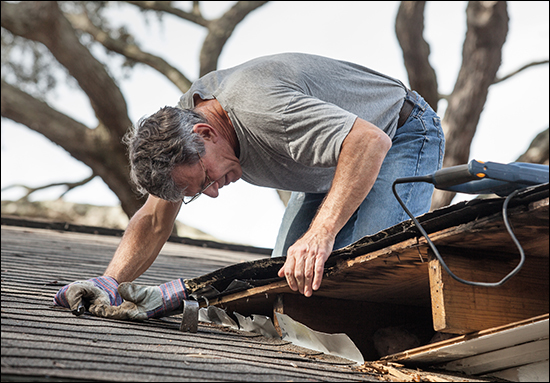 While not always the case, a general rule of thumb is that... On home inspection repairs -- sellers usually have a short term fix mentality -- while buyers usually have a long term fix mentality. And, successfully negotiating agreed upon repairs after a home inspection can be a smoother process if we reflect on the difference in those perspectives. Inspector: Several roof shingles are missing, and the roof is past its life expectancy. Seller: Replace the shingles. Buyer: Replace the roof. Inspector: The air handler coils are dirty and the heat pump is reeaaallly old. Seller: Clean and service the heat pump and air handler. Buyer: Replace them both! These are a few extreme examples to start to show the differences in perspectives on repairs. Again, the important thing here is to recognize that a buyer and seller look at home inspection reports differently. A seller typically wants to minimize their repair costs while keeping the home sale on track. A buyer wants to make sure that any previously unknown property condition issues are addressed in a manner that is likely to prevent further near term maintenance needs in those areas. Both perspectives are reasonable, most of the time, depending on how it plays out related to specific deficiencies of a home.
So, what is a buyer to do? A few thoughts....
| |
When Making A Low Offer, Accentuate Your Other Offer Terms |
|
 If you are making a low offer, you can increase the appeal of your offer by strengthening your other offering terms....
DEPOSITS Make the largest deposit you are comfortable with so the seller knows you have money "on the line" and that you won't risk losing that money by attempting to walk away from the deal. CLOSING COST ASSISTANCE Sellers don't just look at the contract price --- they calculate their net proceeds based on the offer price and any credits or closing cost assistance. Only ask for assistance if you truly need it. FINANCING Provide as much detail as possible about your financing intentions, and always include a pre-approval letter. Sellers who believe you are capable of financing the purchase will be less hesitant as they consider other terms of your offer. And yes -- offer cash, a large pile of it, if you are able. :) PERSONAL PROPERTY Don't automatically ask for everything the seller intends to convey --- if you don't need them all, leave them out of the offer. Allowing the seller to keep their washer/dryer (for example) may make them more flexible in other areas. INSPECTIONS Having a professional inspect the property you are purchasing is usually a good idea; however if you only intend to do it for informational purposes, consider leaving it out of the contract negotiations and conducting it post-settlement. SETTLEMENT & POSSESSION If possible, cater your settlement date and the details of transferring possession of the property to the needs or wants of the seller. This can go a long way towards gaining seller flexibility on other contract terms. Finally, research the seller's context for selling. That information can be invaluable in negotiating a successful contract. | |
There Is Nothing Quite Like Actually Viewing A Home In Person |
|
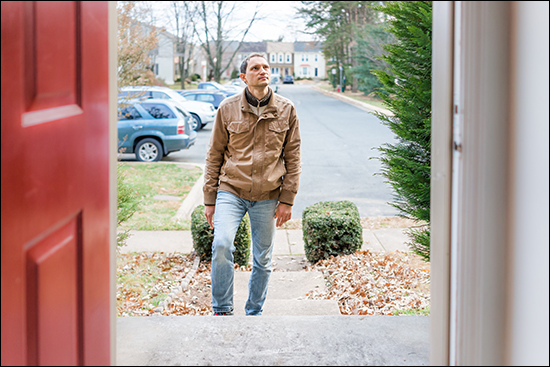 Internet cools are great but they still can't replace an in-person walk through. These days -- you can learn A LOT about a house online. You can typically review:
Sometimes you can even review:
But for many buyers, all of this online review of information and imagery still does not come close to the experience of being inside the home. So -- as a buyer... it's fine to absorb yourself in the online information available for a particular home... but don't hesitate to set up a time to physically view the home if it is of interest. With regularity, actually getting inside a home very quickly intensifies a buyer's interest in the property, or helps the buyer see that it will not work for them. And even more specifically, don't feel like you are wasting your Realtor's time if you want to go look inside homes that only "might" work for you -- you oftentimes aren't going to really know if they will work for you until you are physically inside the property. | |
Monthly Housing Cost For Median Priced Home Climbs |
|
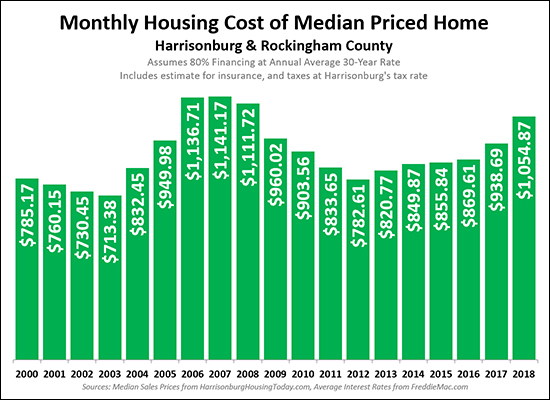 It costs more now than it did a few years ago to buy a home in Harrisonburg and Rockingham County, which should come as no surprise since...
The analysis above shows the combination of all of these factors -- the cost of a mortgage payment (principal, interest, taxes, insurance) based on a buyer financing 80% of a median priced home at the prevailing mortgage interest rate at the time, and with the prevailing real estate tax rate. We have now climbed above $1,000 per month on this metric -- which is the first time we've seen this since 2006 - 2008. Over the next few years, it seems likely we will see a continuation of this trend, as sales prices and mortgage interest rates are both likely to continue to slowly increase. | |
Housing Inventory Levels Likely To Fall Even Further |
|
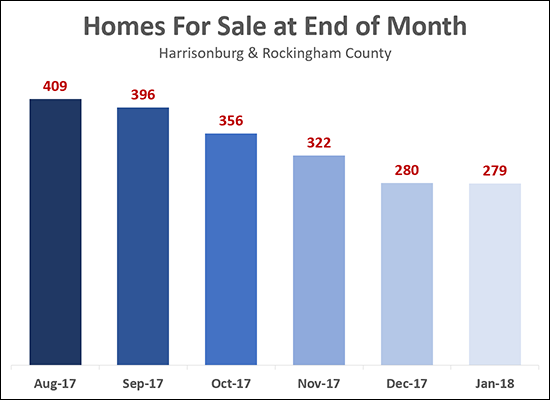 If last year is any indication, get ready to see inventory levels falling over the next few months as the weather gets colder. Inventory levels have fallen 18% over the past year -- and 39% over the past two years -- and we're about to head into the time of year (Fall to Winter) when inventory levels drop to their lowest levels. As shown above, inventory levels fell 32% last year between the end of August and the end of January. As such -- look at the meager supply of homes currently on the market -- and then eliminate 1 out of every 3 of those homes. That's likely where we're headed over the next few months. But here's the good news (sorta, kinda, with limitations) -- if you are thinking of selling your home in the next few months, you may have quite a few buyers angling to purchase it if it aligns well with what they are looking for in a home. The sorta/kinda part is that you'll only be good shape if you don't have to buy as well. After all, if we quickly sell your home (because of low inventory levels), but can't find something for you to buy (because of low inventory levels), then we still have problems. Who is the indisputable winner in today's local housing market? The home seller who does not have to buy a home as well. :-) | |
30 Year Fixed Mortgage Interest Rates Keep Rising |
|
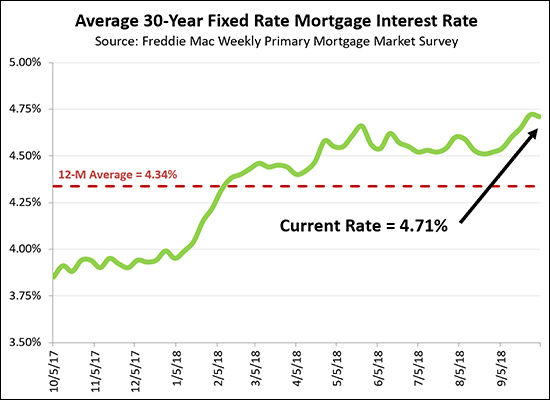 Mortgage interest rates keep on rising. The question now seems to be whether the higher rates will take anyone out of the market to buy -- or will put a damper on rising home values / sales prices. Thus far, buyer activity has continued to be quite strong in 2018 despite these modest increases in interest rates. Interest rates have not quite risen a full percentage point over the past year.... 3.85% back in October 2017 4.71% today | |
Early Indications Show Many Home Buyers Contracted in September |
|
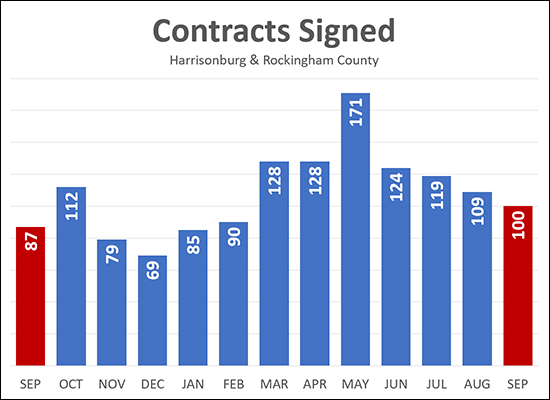 Home buying activity slowed for the fourth straight month in September 2018 -- but -- it was 15% higher than it was last September! As shown above, 100 buyers signed contracts to buy homes in September 2018, a slight decline from 109 the previous month, but an increase over last September. If last year is any indication, we may see an uptick in buying activity in October before things then cool down between November and February. | |
The Local Housing Market Is Not Like An Outdoor Hose Spigot |
|
 Generally speaking, folks don't use their outdoor hose spigots in the winter. I suppose you might use it from time to time, but it's just not as fun to wash your car in the driveway on most December days -- and your lush garden is not lush, and does not need watering. Oh, and if you did use your hose spigot, and left the hose attached, you'd potentially have serious problems when the water in the hose freezes, backs up into the spigot, maybe into the pipe, and something splits, cracks or bursts. So, once we get through Fall, most folks are turning off their hose spigots for the last time until Spring. But not so with the local housing marketing. Between March and August (Spring and Summer, as we'll call it) an average of 130 buyers signed contracts to buy houses each month. A pretty rapid pace of buyer activity. So, this winter, what should we expect? Will that supply of buyers be turned off like a hose spigot, and will the buyers slowly drip out at a rate of 13 buyers per month? Thus, 10% of the pace of buyer activity in the Spring and Summer? Nope! Looking at last Winter (December, January, February) there were an average of 81 buyers signing contracts per month! You read that correctly, only a 38% decline in buyer activity during the Winter months -- as compared to the Spring and Summer months. So, unlike your hose spigot, which will likely be barely used during the Winter -- the local housing market doesn't slow down, or cool down, or shut down, nearly as much. | |
The Smallest House In The Neighborhood |
|
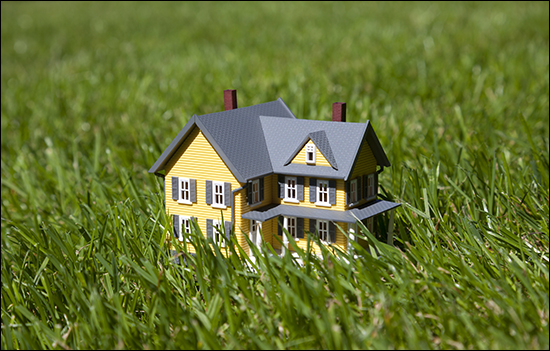 How much should you be willing to pay for the smallest house in a neighborhood? Especially if it is a good bit smaller than all the other houses in the neighborhood? Let's imagine a neighborhood in Harrisonburg or Rockingham County where homes typically sell for $350K - $400K, with an occasional sale above $400K. All of these homes, however, are 3000 SF homes. There might be a 2800 SF homes that sells from time to time, but almost all are at, above, or well above 3000 SF. So -- when a 2300 SF home comes on the market in the neighborhood, how much should you be willing to pay? A seller might say $340K. After all, you have to pay $350K+ to buy any house in this amazing neighborhood, so even if my house is smaller than most, you'll need to pay pretty close to that floor of $350K. A buyer might say $300K. After all, the 2300 SF home is markedly smaller than just about every other home in the neighborhood, so the sales price should be quite a bit lower as well. If a 3000 SF home sells for $350K, I don't want to pay more than $300K for a 2300 SF home. I might say $320K. I think there is merit in both of the perspectives above, and a blending of those two concepts gets us close to what a buyer should be willing to pay. Keep in mind -- it is also possible that a buyer will come along who just LOVES the neighborhood and doesn't need much space at all. This buyer might just be willing to pay closer to that $340K - $350K price, especially if they are a cash buyer, or moving from a more expensive market, etc. | |
Which Imperfections Can You Live With When Buying A Home? |
|
 If you're looking for a resale, four bedroom home with two full bathrooms, a two-car garage, brick exterior, with a flat lot, walk out basement, privacy, views, character, charm, an open layout, defined spaces, nine foot ceilings, hardwood floors, passive solar design, a screened porch, covered porch, deck, patio and rooftop terrace -- then you'd better be ready to relocate anywhere in the US to find such a combination. :-) If you're like the other 99.9% of the home buying population, then you're going to have to make some compromises when you buy your next home -- it won't be perfect in all ways. But, the question is, which imperfections are you willing to accept? In showing a house yesterday, I had an insightful conversation with some current home buyers where we concluded it would certainly be more reasonable to buy a home that is imperfect in the size of a few rooms or the finishes of some interior features -- much more so than it would be reasonable to buy a home that is imperfect in the drainage of the lot or the condition or nature of the roof and heating system. So, when you are buying your next home, and buying an imperfect home -- give some thought to which imperfections you will accept. Imperfections that you can change later -- or that you will never be able to affect? Imperfections that are inexpensive to adjust -- or that will require a major investment? Imperfections that you can easily overlook -- or that will bug you each and every day. | |
How Your Heat Pump Is Like Your Toenail |
|
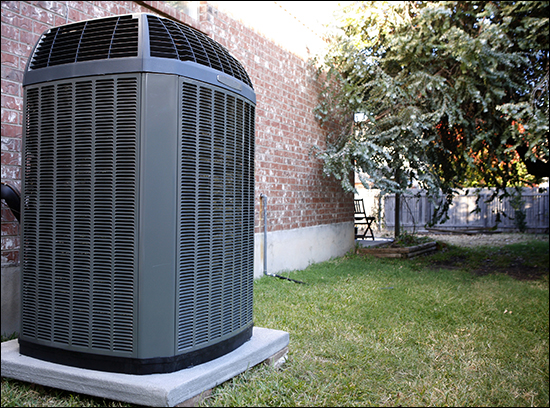 It's time for your annual (semi-annual?) physical with your doc -- and as you review your recent health concerns with your doctor you share that you have been having some severe pain in one of your toes and one of your toenails doesn't look so great. You're not sure -- and it turns out your doctor is not sure -- if it is a drastically in-grown toenail, a fungus, an infection, or something more. Your doctor refers you to a specialist (a podiatrist) for further evaluation to see if everything is OK and what recommendations (if any) they might have. At this point, do you...
I'm going to assume most of us are going to go with the first route -- we aren't going to start hyperventilating about our possible toe removal or foot amputation -- we're going to calmly schedule an appointment with a specialist to learn more, recognizing that our general doc just simply didn't have the expert information with which to fully evaluate whether there was an issue at all and if so how much of an issue it was. So -- can't we start thinking about our heat pump (and our roof, and our deck, and our foundation walls) like toenails? If you're buying a house, and the home inspector recommends that you have your heat pump (or roof, or deck, or foundation walls) evaluated further by a specialist... It is NOT my recommendation that you...
Instead -- consult the expert! See if the _____ is really in bad shape and needs to be replaced, or if, perhaps, everything is fine (or a minor repair is needed) but that the home inspector just didn't have enough specialized expertise to come to that conclusion on their own. Again -- if you get a "hmmm -- I'm not sure about the condition of _____ -- you should consult a specialist" as a part of your home inspection, it is not necessarily an indication that all is lost. Don't cut off your toe! Schedule the follow up appointment with the specialist and keep gather information with which to make a reasonable, objective, educated decision about your potential home purchase. | |
What Is This Property Worth To You, Most People, The Theoretical Buyer |
|
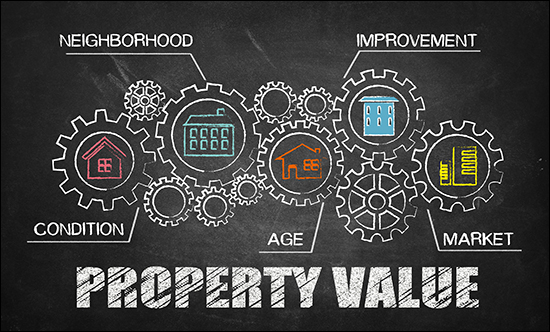 If beauty is in the eye of the beholder, perhaps home value is in the eye of the buyer. While viewing a unique property yesterday, I was discussing the value with my clients. The value of that property (and perhaps any property) can seem to vary quite a bit. Let's pretend the unique property is listed for $400K. (it's not) The value to YOU -- how much a property is worth to you likely relates to how well it fulfill your needs, what your budget is for a purchase, what it would cost to make changes to the house to allow it to work well for you, etc. In this case, the house might only be worth $300K to you because it is larger than you actually need it to be, and you'd need to add a bathroom, and renovate the attic. The value to MOST PEOPLE -- how much a property would be worth to most buyers who might look at it is an important perspective for a seller to seek to understand. If ten possible buyers walked through this home and all concluded that they'd pay $350K, perhaps the house is overpriced. The value to the THEORETICAL BUYER -- in theory, if a buyer existed (now or in the future) for whom this was the absolute perfect amount of space, layout, condition, location, etc., maybe they would be head over heels in love with the house and ready to pay $375K. As a seller, you need to decide if you want to wait for that theoretical buyer -- who might not really exist -- or if you want to price your home to make its value seem reasonable to most people -- or if you want to be willing to negotiate down to a price that could work for nearly anyone. | |
Just Because Major Home Renovations Are Possible Does Not Mean They Are Advisable |
|
 Sometimes you'll see a house that doesn't really work for you -- BUT -- it COULD -- with some major renovations. Maybe that's building an addition, adding a garage, tearing out some interior walls to make larger rooms, etc. Often, you'll determine that these renovations are possible -- but it is my opinion that they are not always advisable. A HOUSE JUST FOR YOU -- You should enjoy the home you live in, and make it your own, however a buyer can go overboard here. If you make major renovations to a home that makes it work ONLY for you -- then later when you try to sell, you may find it to be a challenge if your renovations made it work ideally for you -- and extraordinarily less than ideally for every other possible future owner of the home. OVER-BUILDING FOR THE NEIGHBORHOOD -- If you're buying a home in a neighborhood where homes usually sell for $250K, and you are likely to spend $230K because the house you are purchasing needs work, and then you spend $130K on fixing it up and making it work well for you -- all of a sudden you have a $360K home to try to sell in the future, surrounded by $250K homes. So -- by all means, consider making changes or improvements to the house that you purchase -- but keep in mind the big picture related to eventually selling the house as well. | |
How Much Overlap Exists In Your Home Search Criteria |
|
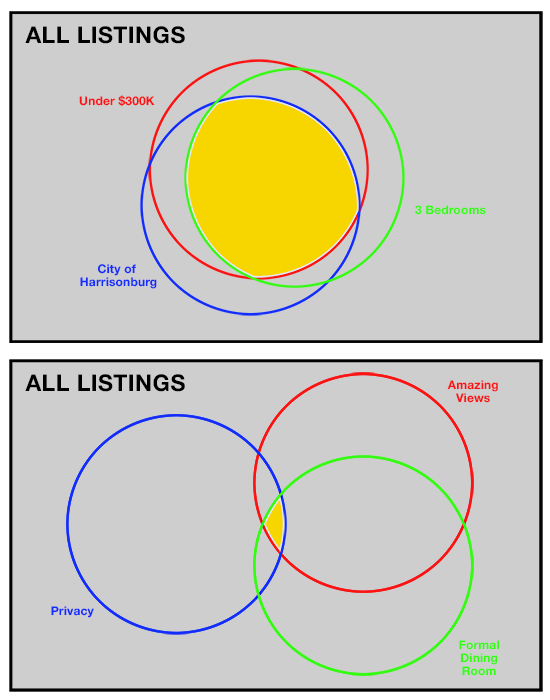 If you have three non-negotiable home search criteria, it is important to reflect on (or at least be aware of) how much overlap exists between these criteria. Above are two examples of this way of thinking about your home search.... The first set of buyers will likely have lots of options (large yellow overlap area) because many homes in the City have three bedrooms and are under $300K. The second set of buyers will likely have very few options (small yellow overlap area) because there are very few homes that somehow offer privacy AND amazing views and happen to have a formal dining room. These are fictitious illustrations -- they don't represent the actual amount of overlap that does or does not exist based on the criteria noted above -- but you should give some thought to how small of an overlap area you are creating for yourself based on what you are defining as non-negotiable in your home search. If that area is too small, you'll have very few options to consider, and eventually you may decide to flex a bit on a non-negotiable point. | |
Local Housing Market Cools, Slightly, in August 2018 |
|
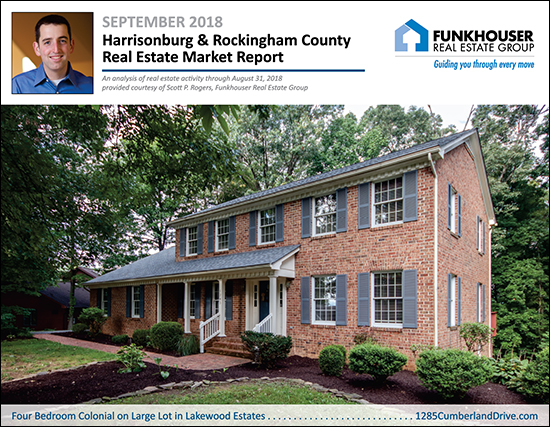 First, learn more about this new listing in Lakewood Estates by visiting 1285CumberlandDrive.com. Now, on to our local real estate market -- I just published my most recent monthly market report, and as usual, you can read on for an overview, download the full report as a PDF or tune in to my monthly video overview of our local housing market... Now, let's take a look at some the trends we're currently seeing in our local housing market... 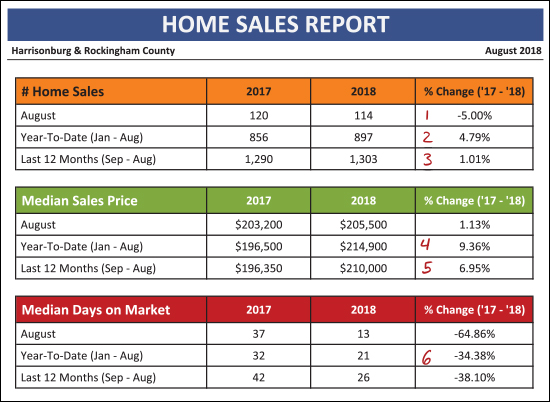 As shown above...
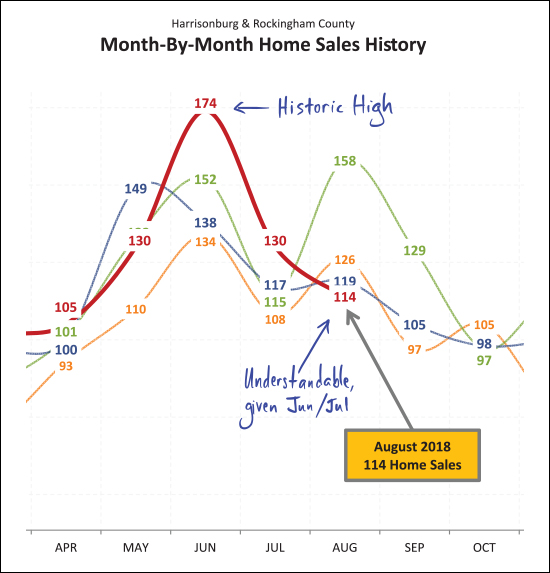 After an extraordinarily robust month of sales in June (174 -- third highest month ever) home sales slowed a bit in July, but remained (at 130) higher than in any recent July. It should be no surprise then that home sales cooled (even if temperatures did not) in August. Perhaps many summer buyers bought earlier in the summer this year than last. In the chart above, orange = 2015, green = 2016, blue = 2017 and red = 2018. So... Jun + Jul + Aug in 2016 = 425 summer buyers Jun + Jul + Aug in 2017 = 374 summer buyers Jun + Jul + Aug in 2018 = 418 summer buyers 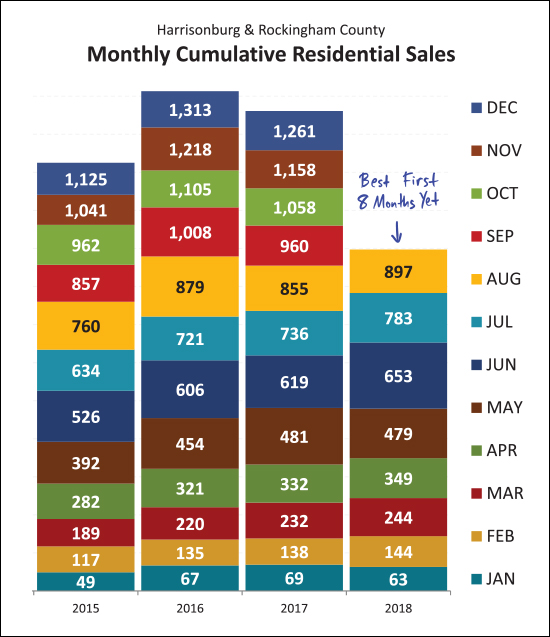 We have seen 897 home sales in the first eight months of the year -- this is more home sales than we've seen in any recent first eight months of the year. At this point, we seem poised to see another 1300+ year of home sales -- which we have only seen one other time in the past decade. 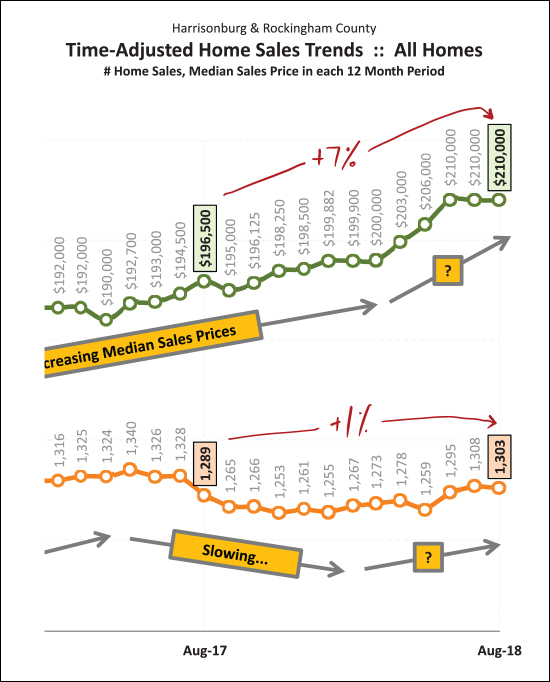 Looking at a rolling 12 month data window -- we see that there has been a net 1% increase in the pace of home sales per year (up to 1303/year) and a 7% increase in the median sales price (up to $210K) over the past year. The median sales price escalated quickly from $200K to $210K this Spring but now has stayed put at $210K for the past few months. 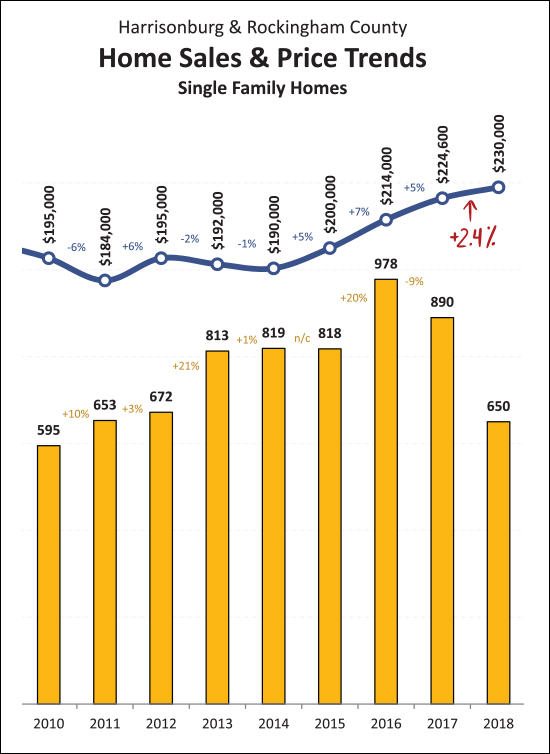 I have never been happier to see such a modest increase in prices as I am to see the 2.4% increase in the median sales price of single family home as shown above. The 7% increase in median sales prices shown on the prior graph reflects not just increases in home values but perhaps a shift in which homes are selling. By looking at only single family homes (excluding duplexes, townhouses and condos) we can (sometimes) get a better sense of actual changes in home values. Here we see that single family home sales prices have increased only 2.4% over the past year. 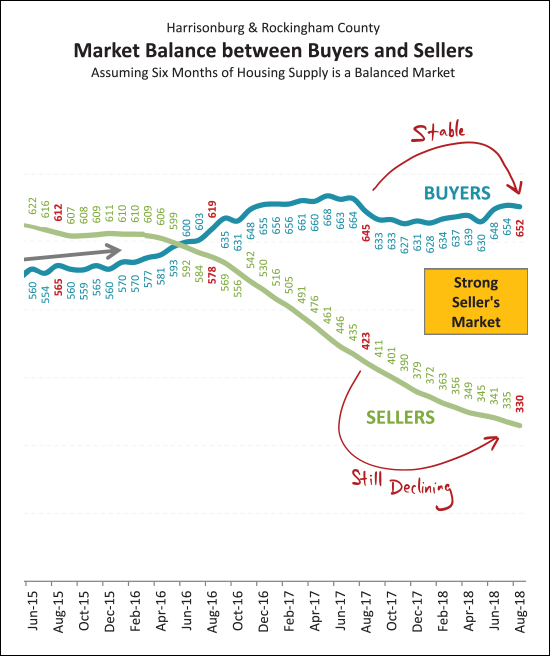 The balance (or imbalance) between buyers and sellers doesn't show any signs of shifting any time soon. After multiple years of increasing buyer activity we are now seeing a relatively stable number of buyers in the market -- around 650 every six months. But at the same time, inventory levels continue to decline -- making it an even stronger seller's market -- with the usual disclaimers of "in most areas, in most price ranges, for most property types, etc." 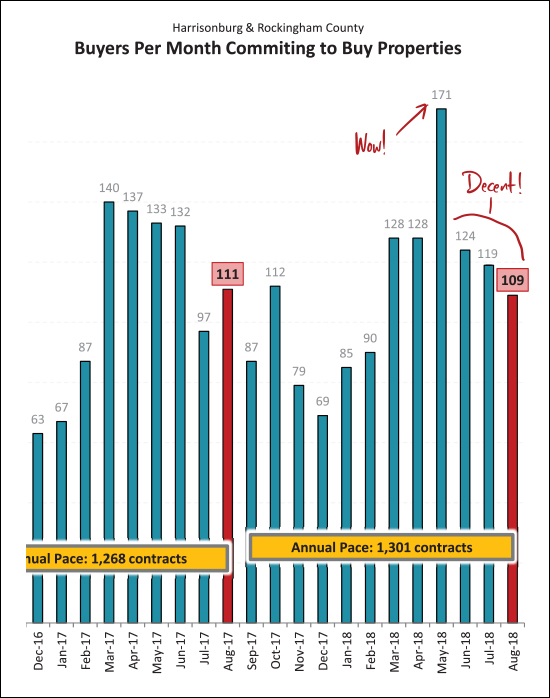 The huge month of sales in June 2018 was foretold by the enormous month of contracts in May 2018. Since that time, we've seen relatively normal months of contract activity. The 109 contracts signed in August 2018 is pretty much in line with the 111 contracts we saw last year. Looking forward, we're likely to see a dip in contract activity in September, possibly a spike in October, before much lower contract numbers between November and February. 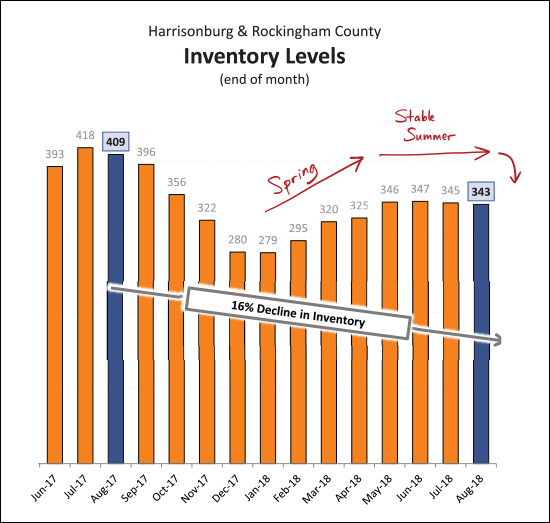 If you thought inventory levels have been low recently, you haven't seen anything yet. After a 16% year over year decline, we're about to head into the Fall and Winter where we inevitably see fewer homes on the market. It seems likely we'll dip below the 300 homes for sale mark again as we did last December and January. An increase in new construction is likely the only thing that can break this drought of listing inventory. 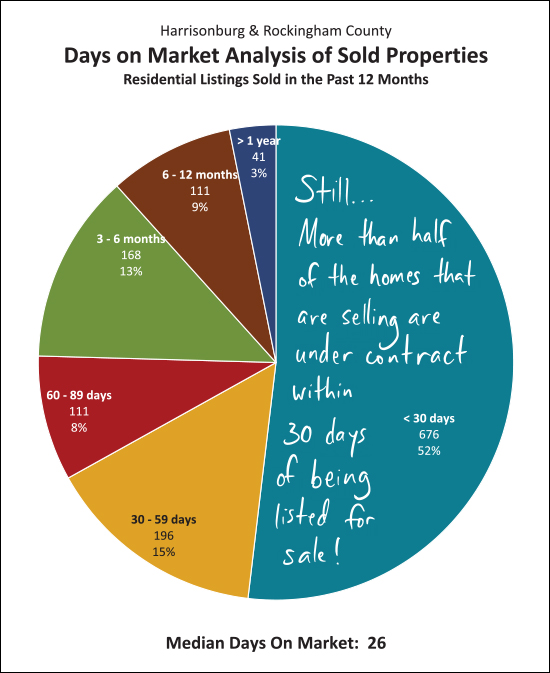 This is absolutely no consolation at all to any home seller who has had their home on the market for 2, 3, 4, 6 or 10 months -- but for sellers about to put their homes on the market, you have a decent chance of selling your home quickly -- again, depending on price point, location, features, finishes, condition, marketing, etc. But, as shown above, slightly more than half of the homes that sold in the past year were under contract within 30 days of being listed for sale. 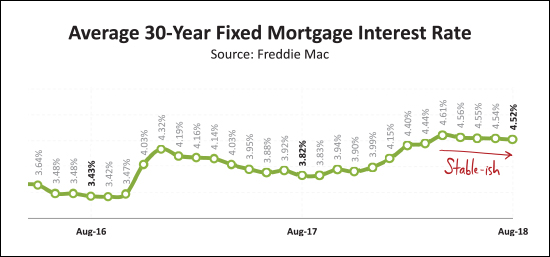 Yes -- interest rates have risen over the past year -- by about 0.75%, which we shouldn't minimize. That said, at 4.5% -- which seems to be where we are hovering for the moment -- this doesn't seem to be drastically changing buyer behavior or housing affordability. OK -- I'll stop there for now. Again, you can download the full report as a PDF, or tune in to my monthly video overview of our local housing market And a few tips for anyone thinking of buying or selling soon -- SELLERS -- even though it is a seller's market in many price ranges right now, you must still focus on price, condition and marketing. For further reading on buying or selling in this area, check out.... | |
Stalemates in House Negotiations |
|
 Some buyers find themselves in a "repeating stalemate" situation -- where they have made offers on multiple offers and they keep coming up short, and not being able to find common ground with the home sellers. In the situation I am describing, it is not a result of the buyer being outbid by another buyer -- but rather, because they repeatedly are not willing to pay a price that the seller is willing to accept. In such a situation, a buyer can start to wonder whose thinking is askew. Are they being unreasonable as buyers, thinking that they should be able to buy one of these homes for $X? Or are the sellers being unreasonable as sellers, thinking that they should be able to sell their home for $Y? In the end, I suppose that if the seller is willing to continue to own their home (and not sell it) then it is OK for them to continue to try to sell their home for $Y if multiple buyers keep walking way from negotiations not willing to pay $Y. And likewise, if a buyer is willing to continue to not buy a home then it is OK for them to continue to walk away from negotiations when sellers won't accept $X for the house. The only way that this type of a stalemate ever ends is when one party finally decides that their long-held and previously non-negotiable position can be compromised. | |
Single Family Homes under $100K in the City are Going, Going Gone! |
|
 It remains difficult to buy a single family home in the City of Harrisonburg for less than $100K. While the 2018 data point (above) is based only on the first eight months of the year, it is clear that fewer and fewer detached homes are selling in Harrisonburg for less than $100K. This is the only home that has sold for less than $100K thus far in 2018... | |
Twice As Many Home Buyers In County than City |
|
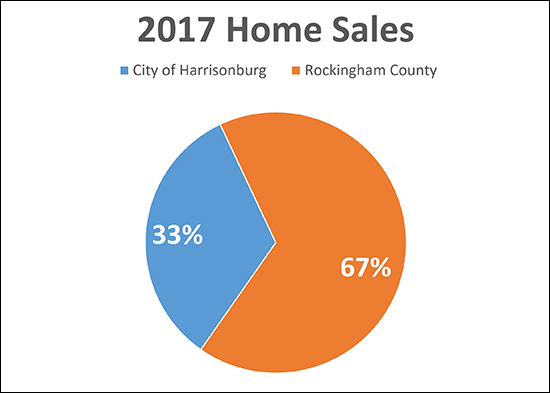 Each year, right around twice as many home buyers purchase homes in Rockingham County as compared to in the City of Harrisonburg. Clearly, the home buyers in the City are much more densely situated -- since the City is comprised of only 17.42 square miles -- while the County spans 849.09 square miles! As a random aside, Rockingham County is the third largest county in Virginia! So -- twice as many buyers in the County -- do sellers in the County have it easier than in the City? Not necessarily, as there are slightly MORE than twice as many homes for sale in the County as compared to the City. 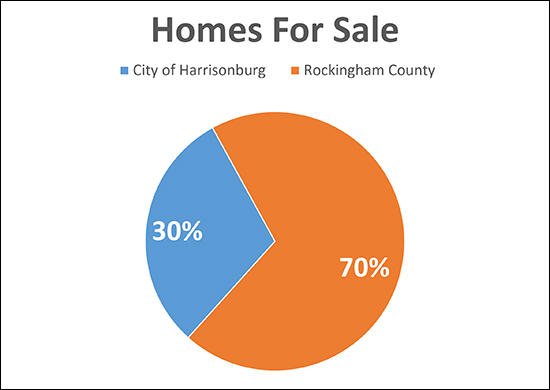 Where will you purchase your next home? In the City or the County? Why? Based on the lot size, privacy, school district, age, property type? | |
Will It Be Harder to Sell Your Home Or Buy The Next One? |
|
 If you are getting ready to sell your home AND buy your home, it can sometimes be difficult to determine where to start... Do you start by finding a house you want to purchase? Or do you start by listing your home for sale? I would suggest that you start with whichever you anticipate will be the most difficult part of the two step process. If it will be difficult to sell your home (because of price, location, layout, features, age, etc.) and it will be at least slight easier to buy the next one (plenty of viable options are listed for sale) then you are likely best off starting with listing your home for sale. Work to get the more difficult half of the transition underway by getting your current home under contract, and then work on the easier side of the transition. If it will be more difficult to buy the next house (because of the specificity of your housing goals, or because of low inventory levels, etc.) and it will be at least slightly easier to sell your current home (because the property type, location or price are in high demand) then you are likely best off focusing first on finding the home to buy -- and then listing your home for sale. There are plenty of nuances we can discuss further to formulate a plan for attempting to simultaneously sell and buy -- but as a general rule of thumb, you'll be best off to start with the harder half of the transaction. | |
| Newer Posts | Older Posts |
Scott Rogers
Funkhouser Real
Estate Group
540-578-0102
scott@funkhousergroup.com
Licensed in the
Commonwealth of Virginia
Home Search
Housing Market Report
Harrisonburg Townhouses
Walk Through This Home
Investment Properties
Harrisonburg Foreclosures
Property Transfers
New Listings

